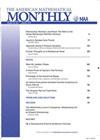The Importance of Being Prime ⋆ , a Nontrivial Generalization for Nonunique Factorizations
IF 0.4
4区 数学
Q4 MATHEMATICS
引用次数: 0
Abstract
AbstractThe notion of primeness is the key to the phenomenon of unique factorization. In particular, when unique factorization in a monoid fails, the arithmetic of that monoid is determined by the irreducible elements which are not prime. We illustrate this with examples of easy-to-understand monoids which are, for the most part, multiplicative submonoids of the natural numbers. Through these examples, we examine the ω-invariant, which offers a quantification of both primeness and nonunique factorization. We close by shifting gears and illustrating the same concepts in noncommutative semigroups, again by using relatively simple constructions involving positive integers.MSC: 13A0511A51 Additional informationNotes on contributorsNicholas R. BaethNICHOLAS R. BAETH passed away on December 11, 2021, at the age of 43, after a brief struggle with cancer. He was a professor at the University of Central Missouri for 13 years and then at Franklin & Marshall College for 312 years. Baeth was a member of the MAA for 25 years. His passion was teaching and doing research with undergraduates, and he was a specialist in algebra. Baeth was a member of the 2005 class for Project NExT, and served on the Merten M. Haase Prize committee. More information about his life and work can be found in his department’s memorial statement https://www.fandm.edu/uploads/files/970943588902998302-nick-baeth-memorial-statement.pdf.Scott T. ChapmanSCOTT T. CHAPMAN is a Texas State University System Regents’ Professor and SHSU Distinguished Professor at Sam Houston State University in Huntsville, Texas. He served as Editor of the American Mathematical Monthly during the period 2012–2016. He is currently serving as Editor-in-Chief at Communications in Algebra. His editorial work, numerous publications in the area of non-unique factorizations, and years of directing REU Programs, led to his designation in 2017 as a Fellow of the American Mathematical Society.作为素数的重要性—非唯一分解的非平凡推广
摘要素数的概念是唯一分解现象的关键。特别地,当单群的唯一分解失败时,该单群的算法是由非素数的不可约元素决定的。我们用一些容易理解的半群来说明这一点,这些半群在很大程度上是自然数的乘法次半群。通过这些例子,我们研究了ω不变式,它提供了质数分解和非唯一分解的量化。最后,我们换了一个方向,用涉及正整数的相对简单的结构来说明非交换半群中的相同概念。nicholas R. BAETH在与癌症作了短暂的斗争后,于2021年12月11日去世,享年43岁。他在中密苏里大学当了13年的教授,然后在富兰克林和马歇尔学院当了312年的教授。Baeth是MAA 25年的成员。他的热情是与本科生一起教学和做研究,他是代数方面的专家。Baeth是2005年NExT项目的成员,并在默滕·m·哈斯奖委员会任职。关于他的生活和工作的更多信息可以在他的部门的纪念声明中找到https://www.fandm.edu/uploads/files/970943588902998302-nick-baeth-memorial-statement.pdf.Scott T. CHAPMAN scott T. CHAPMAN是德克萨斯州亨茨维尔萨姆休斯顿州立大学的德克萨斯州立大学系统董事教授和SHSU杰出教授。2012-2016年,他担任美国数学月刊的编辑。他目前担任Communications in Algebra的主编。他的编辑工作,在非唯一分解领域的众多出版物,以及多年指导REU项目,使他在2017年被任命为美国数学学会会员。
本文章由计算机程序翻译,如有差异,请以英文原文为准。
求助全文
约1分钟内获得全文
求助全文
来源期刊

American Mathematical Monthly
Mathematics-General Mathematics
CiteScore
0.80
自引率
20.00%
发文量
127
审稿时长
6-12 weeks
期刊介绍:
The Monthly''s readers expect a high standard of exposition; they look for articles that inform, stimulate, challenge, enlighten, and even entertain. Monthly articles are meant to be read, enjoyed, and discussed, rather than just archived. Articles may be expositions of old or new results, historical or biographical essays, speculations or definitive treatments, broad developments, or explorations of a single application. Novelty and generality are far less important than clarity of exposition and broad appeal. Appropriate figures, diagrams, and photographs are encouraged.
Notes are short, sharply focused, and possibly informal. They are often gems that provide a new proof of an old theorem, a novel presentation of a familiar theme, or a lively discussion of a single issue.
Abstracts for articles or notes should entice the prospective reader into exploring the subject of the paper and should make it clear to the reader why this paper is interesting and important. The abstract should highlight the concepts of the paper rather than summarize the mechanics. The abstract is the first impression of the paper, not a technical summary of the paper. Excessive use of notation is discouraged as it can limit the interest of the broad readership of the MAA, and can limit search-ability of the article.
 求助内容:
求助内容: 应助结果提醒方式:
应助结果提醒方式:


